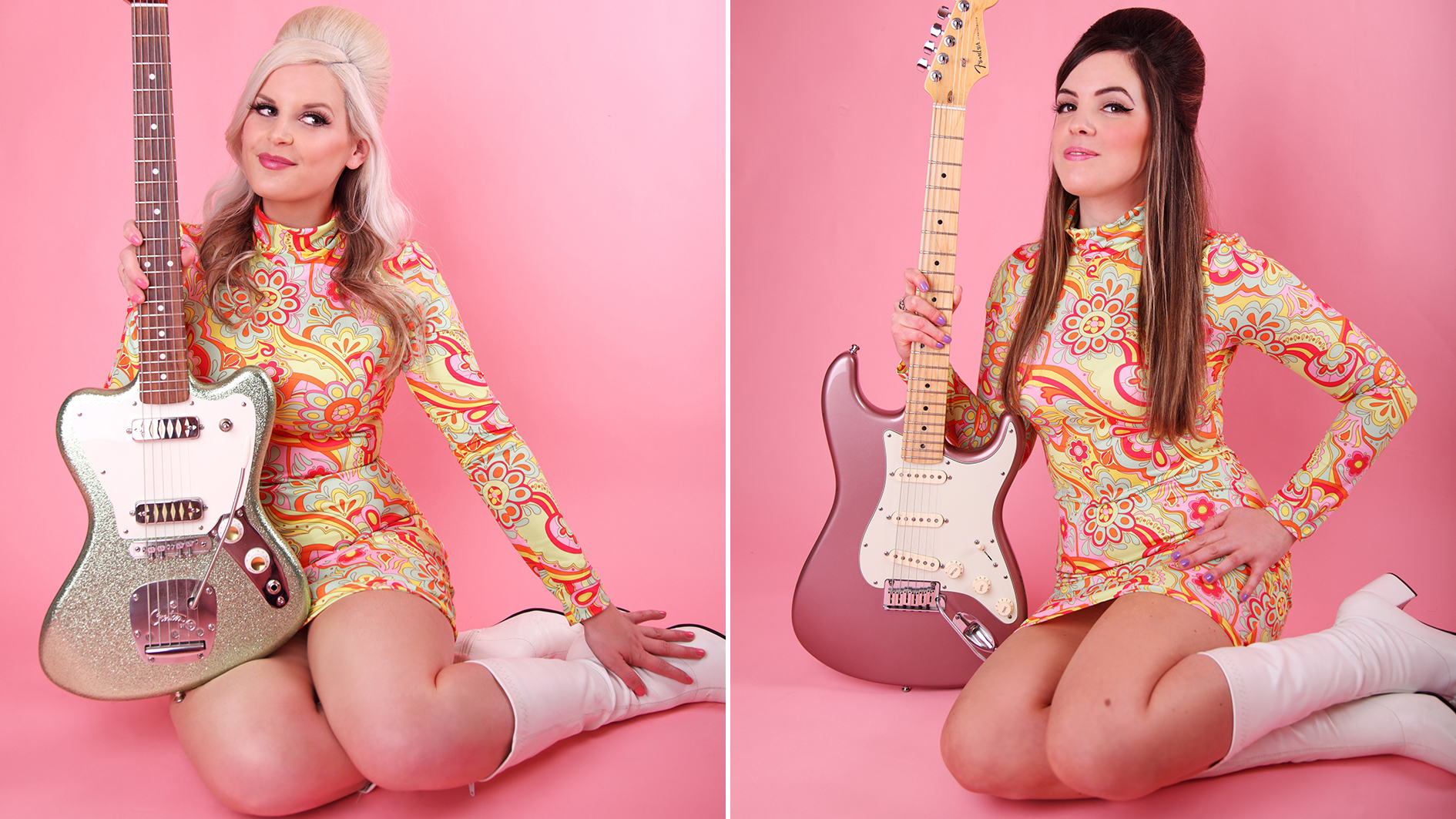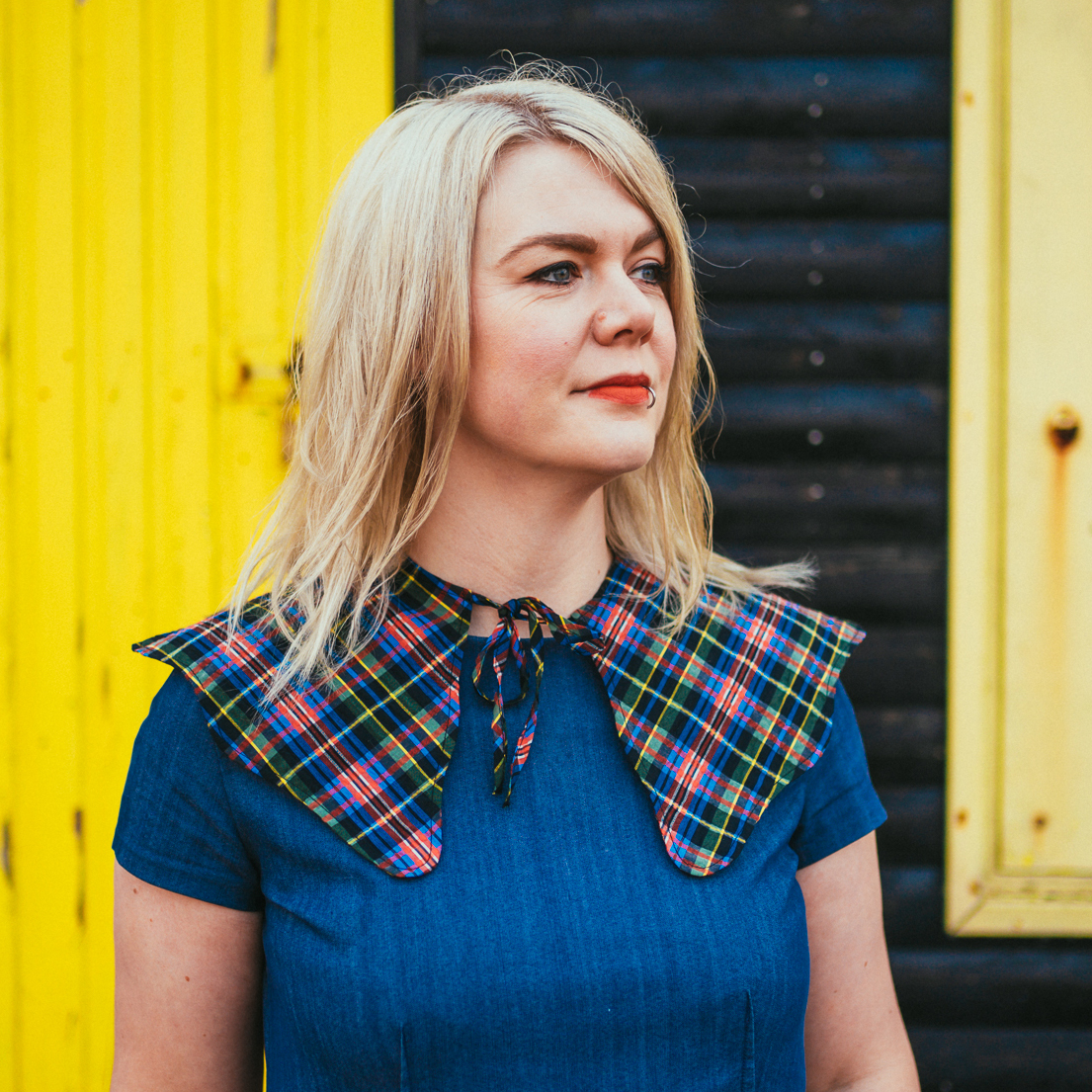The Surfrajettes on riding the wave of the surf rock revival, and adding '60s reverb twang to Britney Spears and Mariah Carey hits
Guitarists Shermy Freeman and Nicole Damoff wax lyrical on their retro-voiced rigs, the difficulties of learning to play on a 12-string acoustic, and why getting new Fender amps was "better than Christmas"

While they may have only performed together since 2015, Toronto instrumentalists The Surfrajettes serve up a refreshingly retro sound. With a sprinkling of psychedelia, sky-high beehives and go-go boots, the foursome could easily be the house band for a Tarantino movie.
It’s true that the director has been given a lot of credit for singing surf’s praises over the years. But, with their debut single Party Line backed by a rollicking revival of Britney Spear's Toxic, The Surfrajettes are also riding the wave of that revival, despite forming on the shores of Lake Ontario.
Earlier this year, the group released their debut LP Roller Fink, a collection of pitch-perfect surf songs that finds lead guitarists Shermy Freeman and Nicole Damoff weaving reverb-drenched lead lines over one another's whammy bar breaks.
Completed by bassist Sarah Butler and drummer Sam Maloney, The Surfrajettes' latest single, the deliciously titled Marshmallow March brings some sunshine cool to an otherwise snowy Saint Nick.
Fresh from a string of live shows and an exciting recent new rig arrangement, Shermy and Nicole dial into our call to praise glissando, gold foil pickups and the power of a good pop song.
When were you first introduced to the guitar, and how did your creative paths collide?
Freeman: “At our school, we had a rock band and a blues band. By grade 11, a lot of my guy friends were performing and I was like, ‘Oh, I want to do that, too,’ so I found a classical guitar in my basement and put steel strings on it. I taught myself chords and joined the acoustic ensemble.
Get The Pick Newsletter
All the latest guitar news, interviews, lessons, reviews, deals and more, direct to your inbox!
“I later auditioned for the rock band and became their first female guitar player. But, fun story, Nicole was the first guitar player in the blues band!”
Damoff: “I started playing guitar at about 13 years old, but the only one available was a 12-string acoustic. My dad was a big Led Zeppelin fan and I didn't know any better. I thought that was normal. Your fingers are supposed to really hurt and everything's supposed to be impossible to play, right?
“I wanted an electric so he was like, ‘Well, I'll buy you one if you take this acoustic and learn some chords on it, I'll buy an electric.’ I stuck with it and remember the first time I played electric. I was like, ‘This is so much easier. You can move without slicing your fingers open!’”
Everyone just wants everything to be as good as possible so we're very quick to say, ‘Oh, you're really good at that, you do that. Or you're better at that, you do that’
With the band dynamics, you often switch between rhythm and lead roles when playing together. How do you decide on those roles within a certain song?
Freeman: “We both have strengths. I'm not good at improvising, so if that's something I hear for a certain part of a song then that's like, 'Rip a solo, Nicole!' Or if there's a lead riff in a glissando, that's something I've figured out so I do it. Musically, there's no ego. Everyone just wants everything to be as good as possible so we're very quick to say, ‘Oh, you're really good at that, you do that. Or you're better at that, you do that.’”
Shermy, you were previously playing a blue sparkle Fender Jaguar but recently added a Creature model from Creston Guitars into your setup. How have you found that transition?
Freeman: “I have two of the Creston guitars. It’s the only guitar I use now. I'm very petite and my Jaguar before was really heavy. I feel more comfortable with a scale guitar. It's made for smaller-framed people. People think Creston’s a niche builder, but he’s made guitars for My Morning Jacket and Adam Ant. I was turned on to him by another female guitar player, Vanessa Wheeler. She and him designed this guitar together.”

What’s so special about Creston’s custom builds?
Freeman: “In my green Creature, I have Curtis Novak pickups. I started in this band playing a Harmony Bobkat. It's too rinky-dink, but that had the gold foils in it. I was scared to get something completely different, so I wanted at least those pickups.
“On my new Creston, it's the Gretsch DynaSonic pickups, because Nicole and I are always keen to keep a different tone from each other and my low-end wasn't as present with the gold foils. I was turning up to have my low-end cut through when really what I needed was a more low-end. I like both Crestons for different reasons: the softer sound for some and then the boomier low-end for other things.”
Nicole, before joining the Surfrajettes you were playing a Gibson Les Paul but then moved over to a Burgundy Mist Stratocaster. What drew you to that model?
Damoff: “I bought the Fender Vintera ‘60s Stratocaster specifically for joining the Surfrajettes. I was planning on getting something a little more budget-friendly but the Vintera really caught my eye and it played so nicely. It was an impulse ‘screw-it’ purchase, but it's the only guitar that I've used since then in the band so it's a good investment.”
For those signature clean reverb sounds, what does the band’s backline look like?
Freeman: “Someone suggested [the Fender Excelsior] to me. We thought it'd be cool to have the matching vintage amps thing going on so Nicole found one an hour north of where we live so we drove up and got it.”
Damoff: “They're limited as they're part of Fender's Pawn Shop series so the fact that I found another one was crazy! It was from Gilbert Guitars in Orillia, Ontario, which is a sleepy cottage town, but they have this guitar shop that happened to have one of these amps! We've upgraded now, though, as you can’t do much with the Excelsiors. It’s just a volume knob and an input!”
Freeman: “Fender upgraded us to Pro Reverbs so we still have the matching amps. They have a lot more tonal control, though, and that's what we were looking for. Nicole and I live together, too, and one day Nicole got home and texted me that there were two giant Fender boxes sitting on the doorstep.”
Damoff: “It was better than Christmas!”
Speaking of the festivities, your latest single, Marshmallow March / All I Want For Christmas Is You takes on the infamous Mariah Carey hit. How do you go about rebranding such a holiday staple adding in the guitar interest?
Freeman: “We had a lot of feedback from when we did Toxic and it was like, ‘Oh, I never liked the song before you guys did it!’ Some people can't see past the end of their own noses. They think they don't like something so it's fun to play it in a different way and be like, ‘Well, do you like it now?’”
Damoff: “There are a lot of great pop songs that people don't like because it's either overplayed or it's a genre that they're too cool to admit that they like. With Toxic, we noticed that that's a really good song structurally. It has that surf tremolo riff in it. Same with the Mariah Carey song. When we cover stuff like that, it's trying to point out ‘No, look, it's a good song. Admit it, come on. Don't be too cool for Mariah Carey or Britney Spears!’”
- The Surfrajettes’ Marshmallow March / All I Want For Christmas Is You is out now via Hi-Tide Recordings.
Cheri Amour is a writer, editor and broadcaster intent on amplifying the voices of women and non-binary artists in print, online and on air. During her twenties, she played lead guitar in a touring two-piece, sharing the stage with The Slits and John Peel-approved punks The Nightingales. Formerly Deputy Editor at TGA Magazine, Cheri headed up its Tech section pouring over pedals with everyone to indie icon Debbie Smith (Echobelly/Curve) to multi-instrumentalist Katie Harkin (Sleater Kinney/Waxahatchee/Wye Oak). She's currently working on an upcoming 33 1/3 book on the unassuming influence of South Bronx sister troupe ESG, out in Spring 2023.
“There’d been three-minute solos, which were just ridiculous – and knackering to play live!” Stoner-doom merchants Sergeant Thunderhoof may have toned down the self-indulgence, but their 10-minute epics still get medieval on your eardrums
“There’s a slight latency in there. You can’t be super-accurate”: Yngwie Malmsteen names the guitar picks that don’t work for shred





![A black-and-white action shot of Sergeant Thunderhoof perform live: [from left] Mark Sayer, Dan Flitcroft, Jim Camp and Josh Gallop](https://cdn.mos.cms.futurecdn.net/am3UhJbsxAE239XRRZ8zC8.jpg)







